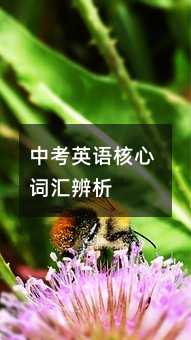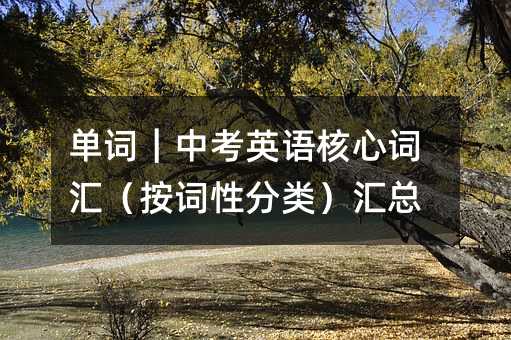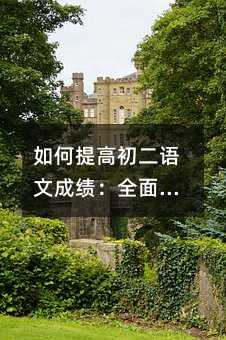中考英语核心词汇辨析

篇1:中考英语核心词汇辨析
一、英语名词可分专有名词和普通名词两大类:
1、专有名词是个别的人、地、物、团体、机构等的专用名称。专有名词中实词的第一个字母要大写。
如:Beijing, Tom, the Peoples Republic of China(中华人民共和国)
专有名词如果是含有普通名词的短语,则必须使用定冠词the。如:the Great Wall(长城)
姓氏名如果采用复数形式,则表示该姓氏一家人(复数含义),如:the Greens( 格林一家人)。
2、普通名词是许多人或事物的共有名称。如:pupil, family, man, foot.
普通名词又分为可数名词和不可数名词。
▲可数名词是可以用简单的数词进行计数的名词,如:box, child, orange;
▲不可数名词是不可以用简单的数词进行计数的名词。如:water, news, oil, population, information .
2、英语可数名词的单复数:英语可数名词有单数和复数两种形式。
1、名词由单数变复数的基本方法如下:
①在单数名词词尾加s。如:map maps,boy boys,horse horses, table tables.
②s,o,x ,sh,ch结尾的词加es.如:classclasses, boxboxes, heroheroes, dishdishes, benchbenches.
[注]:少数以o结尾的词,变复数时只加s。如:photophotos, pianopianos.
以O结尾的名词特殊记:黑人英雄爱吃土豆西红柿
(NegroNegroes, heroheroes, potatopotatoes, tomatotomatoes
③以辅音字母加y结尾的名词,变y为i,再加es。如:familyfamilies, citycities, partyparties.
④以f或fe结尾的名词,变f或fe为v,再加es。如:shelfshelves, wolfwolves, lifelives, knifeknives.
妻子拿刀宰狼,小偷见了直发慌,躲在架后保己命,半片树叶遮目光。
wifewives, knifeknives, wolfwolves, thiefthieves, shelfshelves, selfselves, halfhalves, leaf--leaves
2、不规则变化:
manmen, womanwomen, childchildren, oxoxen, mousemice
toothteeth, goosegeese, foot--feet
sheepsheep, fishfish,deerdeer(神奇的羊鹿鱼)
Chinese Chinese, JapaneseJapanese, EnglishmanEnglishmen, FrenchmanFrenchmen
AmericanAmericans, AustralianAustralians, GermanGermans
中日不变英法变,其他s 加后面
不可数名词一般没有复数形式,说明其数量时,要用有关计量名词。
如:a bag of ricetwo bags of rice,
a piece of paperthree pieces of paper,
a bottle of milkfive bottles of milk.
3、名词所有格:
1、 名词所有格表示所属关系,相当于物主代词,在句中作定语、宾语或主语。其构成法如下:
(1) 表示人或其它有生命的东西的名词常在词尾加s。
如:Childerns Day(儿童节), my sisters book(我姐姐的书)
(2) 以s或es结尾的复数名词。只在词尾加。
如:Teachers Day(教师节)
(3) 有些表示时间、距离以及世界、国家、城镇等无生命的名词,也可在词尾加s.
如:todaysnewspaper(今天的报纸), ten minutes break(十分钟的课间休息),Chinas population(中国的人口).
(4)无论表示有生命还是无生命的东西的名词,一般均可用介词of短语来表示所有关系。如:
a fine daughter of the Party(党的好女儿).legs of a table
2、[注解]:
①s还可以表示某人的家或者某个店铺,
如:my aunts(我阿姨家), the doctors(诊所)
② 两人共有某物时,可以采用A and Bs的形式,如果分别拥有,则分别加s .
如:Lucy and Lilysbedroom(露西和丽丽合住的卧室)
Lucys and lilys boyfriends
③of+名词所有格/名词性物主代词,称为双重所有格,
如:a friend ofmy fathers(我父亲的一位朋友), a friend ofmine(我的一位朋友)
4、名词或代词作主语时和谓语之间的单复数的一致问题:
1、谓语和谓语基本保持单复数的一致,即:主语是可数名词单数或不可数名词时,谓语动词用单数形式:
如:The computerwasa great invention.(计算机是个了不起的发明)
The water in the glass isvery cold.(玻璃杯里的水很冷)
2、集体名词(如family, class, team, group, row, police, school等)做句子主语时,
① 如果表示整体概念,则谓语用单数形式,
如:Class Three is a very good class.(三班是好班)
② 如果表示其中的所有成员时,则谓语用复数形式,
如:Class Threehavea map of China.(三班有张中国地图)
3、Chinese, Japanese, fish, sheep, people等表示单个时谓语用单数,表示许多时,谓语用复数。
如:Thereisa sheep in the yard.(院子里有只绵羊)
There aresome sheep in the yard.(院子里有一些绵羊)
4、maths, news等虽然有s结尾,但不是复数,因此谓语仍用单数:
The newsisvery exciting. (这个消息令人兴奋)
5、glasses, shoes, socks, trousers, gloves等名词往往用复数形式,故谓语用复数。
如:The trousersare very cheap and I want to take them.(裤子很便宜,我想买)
6、a lot of后跟名词复数时谓语用复数形式,跟不可数名词时谓语用单数形式。
如:A lot of students are playingbaseball now.(现在有许多学生在打垒球)
A lot of timewas wastedon that work.(大量的时间花在了那个工作上)(被动句)
1、 and连接两个名词做主语时,谓语原则上用复数,但是两个名词若构成一个整体事物时,谓语则用单数。
如:The teacher and his sonare pickingapples now.(老师和他的儿子在摘苹果)
Fish and chipsisvery famous food. (鱼和薯条是一种出名的食品)
2、 there be句型中be的单复数一般由靠近的名词决定。
如:There isa table and four chairsin the room.(房间里有一张桌子和四张椅子)
3、 用bothand连接两个事物做主语时,谓语一般用复数。
如:Both you and Iare requiredto be here tomorrow.(你和我明天要求都来)
4、 主语中含有with的短语时,谓语单复数由with之前的人物决定。
如:A womanwith a 7-year-old child was standing at the side of the road.
(一名妇女带着一个七岁的孩子(当时)就站在路边)
5、 eitheror或者 neithernor连接两个人物做句子主语时,谓语采用就近原则。
如:Either you orheis right.(要么是你对,要么是他对。/你和他有一个人是对的)
Neither you nor Iam going there.(你和我都不打算去那里)
6、 表示一段时间或长度概念的复数名词做主语时,谓语一般用单数。
如:Two monthsisnot a short time.(两个月不是个短时间)
Two thousand kilometersisquite a long distance(距离).(两千千米是相当长的一段距离)
7、 主语中含有half of / (three quarters)of / all (of) the .等词语时,谓语的单复数由名词确定,
如:Over three quarters of the information on the Internet isin English.
(因特网上四分之三以上的信息是用英语写的)
A third of the students were playing near the lake.(学生的三分之一(当时)正在湖边玩耍)
All of the water in these rivers has been polluted.(这些河流中的水已经被污染了)(被动句)
但是,population一词又有特殊情况:
Whatsthe populationof China?(中国人口是多少?)(句子用单数)
Three quarters of the populationin this city are Arabs(阿拉伯人).
(这个城市四分之三的人口是阿拉伯人)(句子用复数)
5、部分名词用法辨析:
1、sport、game、match、race的区别:
sport通常指户外运动,以锻炼为主,概念较大;
game意思是运动、比赛,不管户内户外还是脑力体力,指以胜负为主的运动;
match意为竞赛、比赛,多指正式比赛;race主要表示赛跑、赛马、赛车。
如:People all around the world enjoy sports.(全世界的人都喜爱运动)
The Olympic Games will be held in Beijing.(奥运会将在北京举行)(被动句)
Our school football team won the league match(联赛).(我们学校足球队取得了联赛冠军)
They were strong and won the boatrace.(汤他们很棒,赢得了划艇比赛)
1、 festival、holiday、vacation的区别:
festival节日,指喜庆的日子或持续一段时间的文娱活动;
holiday(假日、休息日),指法定假日或风俗习惯,复数可以表示一个较长的假期;
vacation假期,指学习或工作中一段长时间的休息。
如:The Shanghai Television Festivalwill be held next month.(上海电视节将在下个月举行) /
Sunday is a holiday and most people do not work.(星期天是个假日,多数人不工作) /
What are you going to do during the summer vacation/holidays?(在暑期你打算做什么事情?)
2、 journey、tour、trip、travel的区别:
journey指在陆地上(或海上或空中)进行的长途旅行,不知终点,含有辛苦的意思;
tour指途中作短期逗留的巡回旅行,强调游览多处,常用来指观光等;
trip通常指往返定时的短途旅行,如出差度假等;
travel多指长期或长途的观光旅行,尤其指到国外,没有明确目的地,也作不可数名词,指旅行这一行为。
如:He made up his mind to make the journeytoDunhuang.(他拿定主意要去敦煌旅行)/
He has gone on a walking tour.(他步行观光去了)/
He took severaltrips to Shanghai last yeaar.(去年他去了上海好几次) /
Did you go to Santiago(圣地亚哥) during your travels?(旅行期间你去圣地亚哥了吗?) /
Travellingthrough thick forests is dangerous.(在密林里边穿行是很危险的)
3、 sound、noise、voice的区别:
sound指各种声音;noise主要指噪音;voice指人的嗓音。
如:The noiseof the street kept me awake in the night.(街上的喧嚣声让我彻夜难眠) /
All of a sudden there was the soundof shots and a cry.(突然间传来几声枪响和一声尖叫) /
The singer has lost her ringing voice as a result of a bad cold.
(因为感冒的缘故,这个歌唱家失去了她银铃般的嗓音)
4、 fish的问题:指许多条鱼且不管种类时,用fish,单复数相同;
fishes指许多种类的鱼;
fish指鱼肉时是不可数名词。
如:There are many kinds of fishesin the pool. (池子里有很多种类的鱼)/
I prefer fish to meat.(与肉相比我更喜欢鱼)
篇2:中考英语核心词汇辨析
1. clothes, cloth, clothing
clothes统指各种衣服,谓语动词永远是复数, cloth指布,为不可数名词 clothing 服装的总称,指一件衣服用a piece of, an article of
2. incident, accident
incident指小事件, accident指不幸的事故He was killed in the accident.
3. amount, number
amount后接不可数名词, number后接可数名词 a number of students
4. family, house, home
home 家,包括住处和家人,house房子,住宅,family家庭成员. My family is a happy one.
5. sound, voice, noise
sound自然界各种各样的声音,voice人的嗓音,noise噪音I hate the loud noise outside.
6. photo, picture, drawing
photo用照相机拍摄的照片,picture可指相片,图片,电影片,drawing画的画
Let's go and see a good picture.
7. vocabulary, word
vocabulary词汇,一个人拥有的单词量,word具体的单词He has a large vocabulary.
8. population, people
population人口,人数,people具体的人 China has a large population.
9. weather, climate
weather一天内具体的天气状况,climate长期的气候状况 The climate here is not good for you.
10. road, street, path, way
road具体的公路,马路,street街道,path小路,小径,way道路,途径
take this road; in the street, show me the way to the museum.
11. course, subject
course课程(可包括多门科目),subject科目(具体的学科)a summer course
12. custom, habit
custom传统风俗,习俗,也可指生活习惯,后接to do, habit生活习惯,习惯成自然,后接of doing. I've got the habit of drinking a lot.
13. cause, reason
cause 指造成某一事实或现象的直接原因,后接of sth./doing sth,reason用来解释某种现象或结果的理由,后接for sth./doing sth. the reason for being late
14. exercise, exercises, practice
exercise运动,锻炼(不可数),exercises练习(可数),practice(反复做的)练习
Practice makes perfect.
15. class, lesson
作"课"解时,两者可以替换.指课文用lesson. 指班级或全体学生用class. lesson 6; class 5
16. speech, talk, lecture
speech指在公共场所所做的经过准备的较正式的演说,talk日常生活中的一般的谈话,讲话,lecture学术性的演讲,讲课 a series of lecture on…
17. officer, official
officer部队的军官,official政府官员 an army officer
18. work, job #p#分页标题#e#
二者均指工作。work不可数,job可数 a good job
19. couple, pair
couple主要指人或动物,pair多指由两部分组成的东西 a pair of trousers
20. country, nation, state, land
country侧重指版图,疆域,nation指人民,国民,民族,state侧重指政府,政体,land国土,国家 The whole nation was sad at the news.
21. cook, cooker
cook厨师,cooker厨具 He is a good cook.
22. damage, damages
damage不可数名词, 损害,损失; damages复数形式, 赔偿金 $900 damages
23. police, policeman
police警察的总称,后接复数谓语动词,policeman 指某个具体的警察 The police are questioning everyone in the house.
24. problem, question
problem常和困难连系,前面的动词常为think about, solve, raise,question常和疑问连系,多和ask, answer连用
25. man, a man
man人类,a man一个男人 Man will conquer nature.
26. chick, chicken
二者均可指小鸡,chicken还可以当鸡肉 The chicken is delicious.
27. telegram, telegraph
当电报解时,telegram指具体的,telegraph指抽象的 a telegram, by telegraph
28. trip, journey, travel, voyage
travel是最常用的,trip指短期的旅途,journey指稍长的旅途,voyage指海上航行a three-day trip
29. sport, game
sport多指户外的游戏或娱乐活动,如打球,游泳,打猎,赛马等;game指决定胜负的游戏,通常有一套规则 His favorite sport is swimming.
30. price, prize
price价格,prize奖,奖品,奖金 win the first prize The price is high/low.
31. a number of, the number of
a number of许多,谓语动词用复数。the number of…的数目,谓语动词用单数。The number of students is increasing.
32. in front of, in the front of
in front of范围外的前面,in the front of范围内的前面 In the front of the room sits a boy.
33. of the day, of a day
of the day每一天的,当时的,当代的, of a day暂时的,不长久的 a famous scientist of the day
34. three of us, the three of us
three of us我们(不止三个)中的三个,the three of us我们三个(就三个人)The three of us---Tom, Jack and I went to the cinema.
35. by bus, on the bus
by bus表手段,方式,不用冠词,on the bus表范围 They went there by bus.
36. for a moment, for the moment
for a moment 片刻,一会儿,for the moment暂时,一时 Thinking for a moment, he agreed. #p#分页标题#e#
37. next year, the next year
next year将来时间状语,the next year过去将来时间状语
He said he would go abroad the next year.
38. more than a year, more than one year
more than a year一年多,more than one year超过一年(两年或三年等)
39. take advice, take the(one's) advice
take advice征求意见,take the advice接受忠告 He refused to take the advice and failed again.
40. take air, take the air
take air传播,走漏,take the air到户外去,散步 We take the air every day.
篇3:中考英语核心词汇辨析
41. in a word, in words
in a word总之,一句话, in words口头上 In a word, you are right.
42. in place of, in the place of
in place of代替,in the place of在…地方 A new building is built in the place of the old one.
43. in secret, in the secret
in secret秘密地,暗自地,偷偷地,一般用作状语;in the secret知道内情,知道秘密,
一般用作表语 My mother was in the secret from the beginning.
44. a girl, one girl
a girl可泛指所有女孩, one girl一个女孩 Can one girl carry such a big box?
45. take a chair, take the chair
take a chair相当于sit down坐下,take the chair开始开会
46. go to sea, by sea, by the sea
go to sea当海员,出航,by sea乘船,由海路, by the sea在海边 go by sea
47. the doctor and teacher, the doctor and the teacher
the doctor and teacher指一个人,既是医生又是老师,the doctor and the teacher两个人,一个医生和一个老师 the doctor and teacher is
48. in office, in the office
in office在职的,in the office在办公室里 He is in office, not out of office.
49. in bed, on the bed
in bed卧在床上,on the bed在床上 The book is on the bed. He is ill in bed.
50. in charge of, in the charge of
in charge of管理,负责照料, in the charge of由……照料 He is in charge of the matter. The matter is in the charge of her.
51. in class, in the class
in class在课上,in the class在班级里 He is the best student in the class.
52. on fire, on the fire
on fire着火,on the fire在火上 Put the food on the fire. The house is on fire.
53. out of question, out of the question
out of question毫无疑问的,out of the question不可能的
54. a second, the second
a second又一,再一,the second第…… He won the second prize.
55. by day, by the day
by day白天,by the day按天计算 The workers are paid by the day.
56. the people, a people
the people指人,a people指民族 The Chinese is a peace-loving people.
57. it, one
it同一物体,one同类不同一 I lost my pen. I have to buy a new one.
58. that, this
that指代上文所提到的,this导出下文所要说的 I was ill. That's why…
59. none, nothing, no one
none强调有多少,nothing, no one强调有没有,nothing指物,no one指人
--- How many…/How much…? --- None. #p#分页标题#e#
60. anyone, any one
anyone指人,不能接of,any one指人物均可,可接of any one of you
61. who, what
who指姓名或关系,what指职业或地位 What is your dad? He is a teacher.
62. what, which
what的选择基础是无限制的,which在一定范围内进行选择
Which do you prefer, bananas or apples?
63. other, another
other后接名词复数,another后接名词单数 other students, another student
64. not a little, not a bit
not a little非常,not a bit一点也不 I'm not a bit tired. 我一点儿也不累。
65. many, much, a lot of
many和可数名词连用,much和不可数名词连用,a lot of可数,不可数均可,但不用于否定句 I haven't many books.
66. much more…than, many more…than
much more…than后接形容词或不可数名词,many more…than后接可数名词 many more people, much more water, much more beautiful
67. no, not
no=not a/any no friend=not a/any friend no water=not any water
68. no more than, not more than
no more than相当于only,仅仅,只有,not more than 至多,不超过
69. majority, most
majority只能修饰可数名词,most可数不可数均可 the majority of people
70. by oneself, for oneself, to oneself, of oneself
by oneself单独的,独自的,for oneself为自己,to oneself供自己用的,of oneself 自行的,
自动的 The door opened of itself.
71. at all, after all
at all根本,全然, after all到底,毕竟 After all he is a child.
72. tall, high
tall常指人或动物,high常指物体 He is tall.
73. fast, quickly
fast侧重于指人或物体具有运动速度快的特点,quickly侧重指某事完成或发生的快 run fast, answer the question quickly
74. high, highly
high具体的高,highly抽象的高,高度的 think highly of
75. healthy, healthful
healthy健康的,健壮的,healthful有益于健康的 healthful exercise
76. sleeping, asleep, sleepy
sleeping正在睡觉,asleep睡着,熟睡,只能做表语,sleepy困的,有睡意的
a sleeping baby The baby is asleep. I'm sleepy.
77. gold, golden
gold指真金制品,golden指金色的,但金鱼用gold fish a gold ring
78. most, mostly
most用于表感受的肯定句中,相当于very,当大部分,大多数解时是形容词或名词,
mostly大部分,是副词 most people, the people are mostly… #p#分页标题#e#
79. just, very
just表强调时是副词,作状语,very表强调时是形容词,用作定语 the very man, just the man
80. wide, broad
wide侧重于一边到另一边的距离,broad侧重于幅面的宽广broad shoulders



